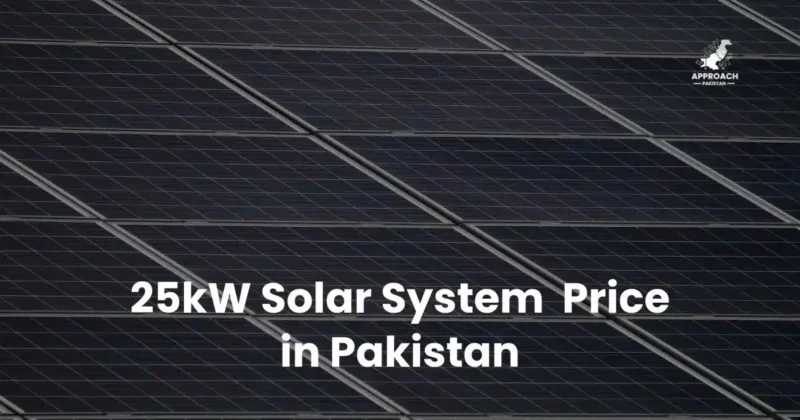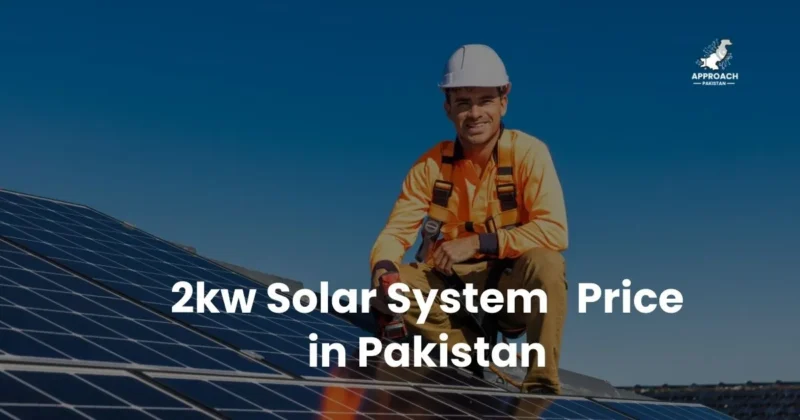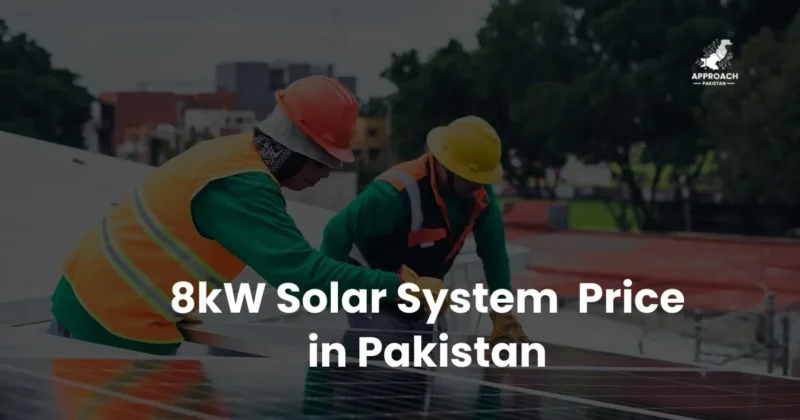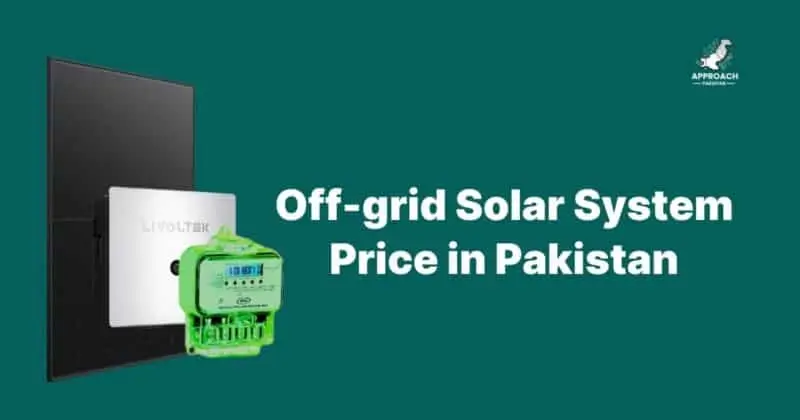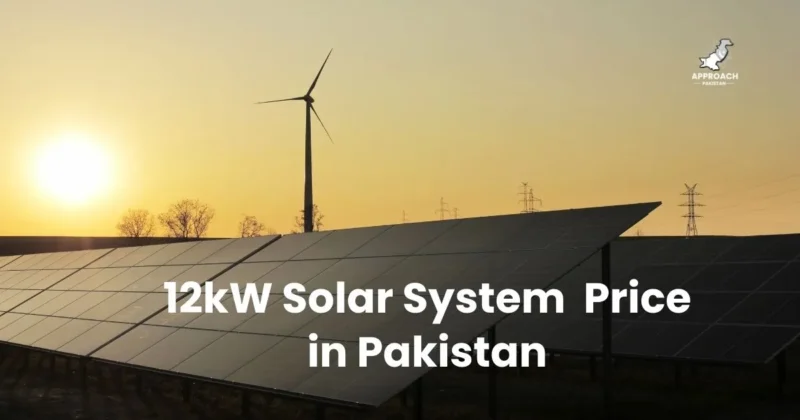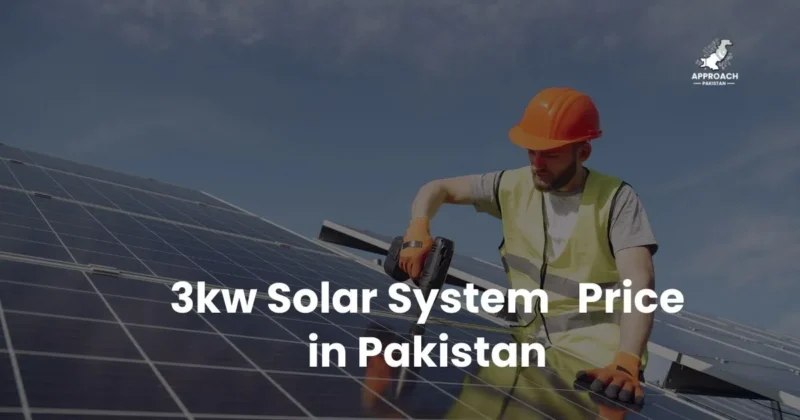1KW Solar System Price in Pakistan (2025) – Complete Cost Breakdown & ROI
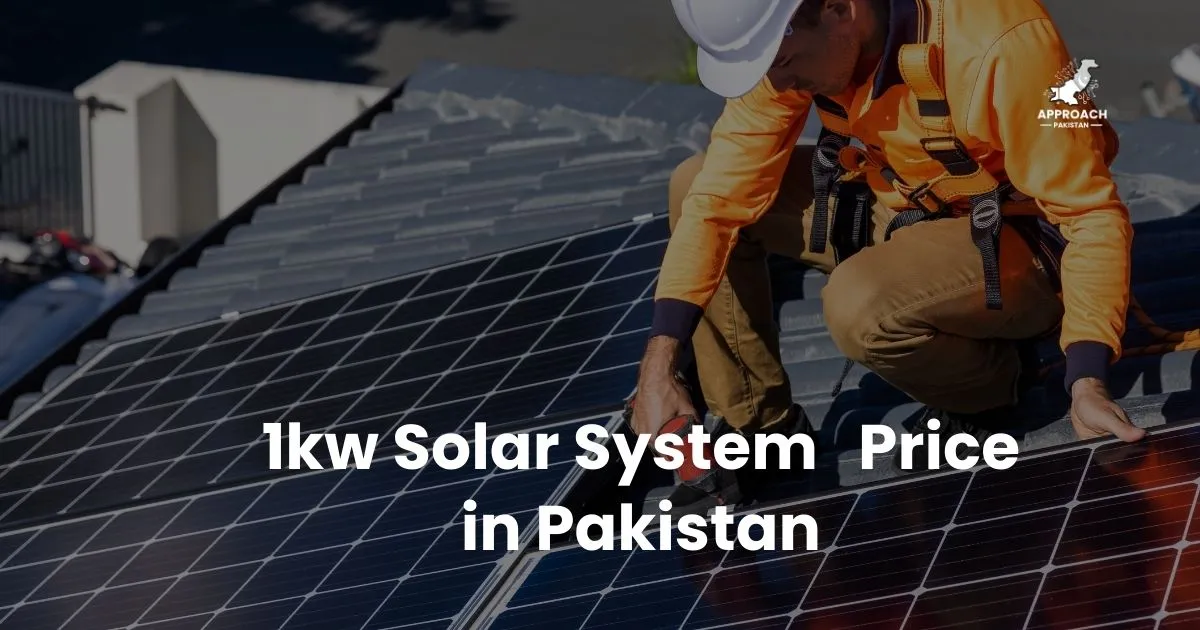
A 1KW solar system in Pakistan costs PKR 150,000-210,000 and generates 4-5 units daily, reducing electricity bills by 60-80% for households consuming 300-500 monthly units. With current WAPDA tariffs at PKR 65 per unit, you’ll recover your investment within 3-4 years while achieving energy independence.
Tired of watching your electricity bill climb past PKR 10,000 monthly? You’re not alone. With WAPDA tariffs hitting 65 PKR per unit, Pakistani families face a brutal choice: pay crushing bills or endure load-shedding darkness.
A 1KW solar system offers an escape route. But here’s the reality check – you’ll face upfront costs between PKR 150,000-210,000. That’s a financial mountain for middle-class families already stretched thin.
The solar market feels like a maze. Counterfeit panels flood the market. Dealers disappear after installation. Technical jargon confuses even educated buyers. Net metering policies change faster than weather forecasts.
Yet thousands of Pakistani homeowners are making the leap. They’re slashing electricity bills by 80%. They’re achieving energy independence while boosting their social status as clean energy pioneers. Smart buyers are turning their rooftops into profit centers.
1KW Solar System Price Breakdown in Pakistan
A complete 1KW solar system in Pakistan costs between PKR 150,000-210,000, depending on component quality and installation complexity. Premium systems with branded components reach PKR 250,000, while basic setups start at PKR 130,000.
Complete 1KW Solar System Price Table
| System Type | Components | Price Range | Best For |
| Budget System | Astro Energy panels + SolarMax inverter + OSAKA battery | PKR 150,000-170,000 | Cost-conscious buyers |
| Standard System | Jinko panels + Knox inverter + AGS battery | PKR 175,000-195,000 | Average households |
| Premium System | Longi panels + Solis inverter + EXIDE battery | PKR 200,000-230,000 | Quality-focused buyers |
| Luxury System | Canadian panels + Hybrid inverter + Lithium battery | PKR 350,000-450,000 | High-end installations |
Component-wise Price Breakdown
| Component | Budget Option | Standard Option | Premium Option |
| Solar Panels (2kW) | PKR 54,000 (Astro Energy) | PKR 58,000 (Jinko) | PKR 62,000 (Longi) |
| Inverter (1kW) | PKR 38,000 (SolarMax) | PKR 50,000 (Knox) | PKR 65,000 (Solis) |
| Battery (200Ah) | PKR 65,000 (OSAKA) | PKR 75,000 (AGS) | PKR 85,000 (EXIDE) |
| Installation & Accessories | PKR 15,000 | PKR 20,000 | PKR 25,000 |
| Total System Cost | PKR 172,000 | PKR 203,000 | PKR 237,000 |
Here’s where your money goes based on June 2025 market rates:
Solar Panels: PKR 40,000-75,000
- Longi panels: PKR 29 per watt (PKR 58,000 for 2kW)
- Jinko N-type: PKR 29 per watt (PKR 58,000 for 2kW)
- Canadian Topcon: PKR 31 per watt (PKR 62,000 for 2kW)
- Astro Energy N-type: PKR 27 per watt (PKR 54,000 for 2kW)
Inverter: PKR 30,000-70,000
- Entry-level residential: PKR 25,000-35,000
- 1kW pure sine wave: PKR 40,000-70,000
- Mid-range (1-3kW): PKR 60,000-75,000
Batteries: PKR 60,000-120,000
- AGS Deep Cycle (185-230Ah): PKR 62,800-79,700
- EXIDE TR-2000 Deep Cycle: PKR 56,500
- Premium lithium options: PKR 172,000-285,000
Installation & Accessories: PKR 15,000-25,000
- Mounting structure: PKR 8,000-12,000
- Wiring and protection: PKR 5,000-8,000
- Labor charges: PKR 8,000-15,000
Regional price differences exist. Karachi systems cost 8-12% more due to higher logistics costs. Rural areas face 15-20% installation premiums due to limited technician availability.
What is a 1KW Solar System?
A 1KW solar system generates 1000 watts of peak power under ideal conditions, producing 4-5 units (kWh) of electricity daily in Pakistan. It typically consists of 3-4 solar panels rated at 300-400 watts each, plus inverter, batteries, and mounting equipment.
Think of it like a small power plant on your roof. The “1KW” rating represents maximum power output when the sun hits panels at perfect angles around noon.
Real-world performance differs from lab ratings. Pakistani conditions reduce output by 15-25% due to:
- Dust accumulation (10-15% loss)
- High temperatures (5-8% loss)
- Partial shading (variable)
- System inefficiencies (5-7% loss)
Daily generation varies by season:
- Summer: 5-6 units per day
- Winter: 3-4 units per day
- Monsoon: 2-3 units per day
Your system works in three stages. Solar panels convert sunlight to DC electricity. The inverter changes DC to AC power your appliances need. Batteries store excess power for nighttime use.
System sizing comparison for different needs:
- 1KW system: Small homes, 300-500 monthly units
- [2kw solar system price in Pakistan]: Medium homes, 500-800 monthly units
- [3kw solar system price in Pakistan]: Large homes, 800-1200 monthly units
- [5kw solar system price in Pakistan]: Commercial use, 1500+ monthly units
Grid-tied vs Off-grid systems offer different benefits. [On-grid solar system price in Pakistan] options sell excess power back through net metering. [Off-grid solar system price in Pakistan] systems provide complete independence but need larger battery banks. Understanding [hybrid solar system price in Pakistan] helps you choose the right balance between grid connection and energy storage.
Complete 1KW Solar System Component Breakdown & Costs
Solar Panels (3-4 panels needed)
Monocrystalline panels dominate Pakistan’s market. They’re 18-22% efficient and handle heat better than alternatives.
Top panel brands in Pakistan:
- Longi Solar: PKR 22-25 per watt
- JA Solar: PKR 20-23 per watt
- Canadian Solar: PKR 18-21 per watt
- Jinko Solar: PKR 17-20 per watt
Panel warranties split into two parts. Performance warranty guarantees 80% output after 25 years. Product warranty covers manufacturing defects for 10-12 years.
Inverters (Heart of your system)
Pure sine wave inverters cost more but protect sensitive electronics. Modified sine wave inverters damage computers and LED lights over time.
Popular inverter models (June 2025 prices):
- Solis 1kW: PKR 52,000-65,000
- SolarMax 1kW: PKR 38,000-52,000
- Knox/Inverex 1kW: PKR 42,000-55,000
- Crown Solar 1kW: PKR 40,000-50,000
Look for MPPT charge controllers. They’re 30% more efficient than PWM controllers in Pakistani sunshine conditions.
Batteries (Energy storage backbone)
Deep cycle batteries last 5-7 years with proper maintenance. Car batteries die within 18 months in solar applications.
Battery capacity calculation: For 1KW system: 200-300Ah capacity minimum Daily backup needed × Safety margin = Battery size (6 hours × 1.5 safety factor = 300Ah recommended)
Battery options with current prices:
- AGS Deep Cycle (200Ah): PKR 79,700
- EXIDE TR-2000 (200Ah): PKR 56,500
- OSAKA Tubular (185Ah): PKR 65,000-75,000
- Narada Lithium (100Ah): PKR 530,700-550,300
Battery technology comparison:
Lithium batteries: 10+ year life, maintenance-free, PKR 530,000+
Tubular batteries: 4-5 year life, needs maintenance, PKR 55,000-80,000
AGM batteries: 5-6 year life, moderate cost, PKR 62,000-90,000
Power Generation & Load Analysis
PHow many devices can we power with 1KW?
A 1KW solar system can simultaneously run 800-900 watts of appliances, powering combinations like: 4 LED bulbs (40W), 3 ceiling fans (225W), 1 LED TV (65W), 1 laptop (50W), and phone chargers (20W) – totaling 900 watts with safety margin.
The key word is “simultaneously.” You can’t run a 1500W microwave on a 1KW system. But you can run it when other appliances are off.
Common appliance power consumption:
- LED bulb: 9-12 watts
- Ceiling fan: 75 watts
- Refrigerator: 150-200 watts
- LED TV (32″): 60-80 watts
- Laptop: 45-65 watts
- Mobile charger: 5-10 watts
- Iron: 1000-1500 watts
- Microwave: 800-1200 watts
Load management strategy: Run heavy appliances (iron, microwave) during peak sun hours. Use stored battery power for lights and fans after sunset.
Seasonal considerations: Summer generation covers AC fans and coolers partially. Winter generation struggles with heaters and geysers. Plan your usage accordingly.
When to consider larger systems: If your monthly consumption exceeds 500 units, explore [4kw solar system price in Pakistan] or [6kw solar system price in Pakistan] options. Commercial setups benefit from [10kw solar system price in Pakistan] or larger installations. Industrial applications require [20kw solar system price in Pakistan] to [30 kw solar system price in Pakistan] depending on load requirements.
Installation Process & Requirements
Roof requirements matter more than you think. Your roof needs 100-120 square feet of unshaded space. South-facing roofs perform best, but east-west orientations work fine.
Structural assessment comes first. Concrete roofs handle mounting easily. Tin roofs need reinforcement. Asbestos roofs require special mounting techniques.
Installation timeline:
- Day 1: Site survey and design
- Day 2-3: Component delivery and staging
- Day 4: Mounting structure installation
- Day 5: Panel installation and wiring
- Day 6: Inverter and battery setup
- Day 7: System testing and commissioning
Common installation mistakes:
- Insufficient grounding (fire hazard)
- Poor cable management (rodent damage)
- Inadequate ventilation (battery issues)
- Wrong tilt angles (reduced output)
Professional vs DIY installation: DIY saves PKR 8,000-15,000 but voids warranties. Professional installation includes permits, testing, and after-sales service.
Choose installers with AEDB certification. They understand local regulations and safety codes.
Financial Analysis & ROI
Monthly savings analysis:
- Average monthly bill before solar: PKR 8,000-12,000
- Monthly bill after 1KW solar: PKR 2,000-4,000
- Monthly savings: PKR 4,000-8,000
- Annual savings: PKR 48,000-96,000
Payback period calculation: System cost ÷ Annual savings = Payback years PKR 180,000 ÷ PKR 72,000 = 2.5 years
Net metering benefits (Updated March 2025): IMPORTANT UPDATE: The government revised net metering rates in March 2025. New installations receive PKR 10 per unit for exported electricity (down from PKR 19.32). Existing net metering customers keep their original rates until agreements expire.
Current financial impact:
- Old rate (existing customers): PKR 19.32 per unit
- New rate (after March 2025): PKR 10 per unit
- Grid electricity cost: PKR 65-70 per unit
25-year financial projection (with new net metering rates):
- Total investment: PKR 180,000
- Annual electricity savings: PKR 48,000-72,000
- Net metering earnings (reduced): PKR 12,000-24,000 annually
- Total 25-year savings: PKR 1,500,000-2,000,000
- Net profit: PKR 1,320,000-1,820,000
- ROI: 730-1,010%
System size comparison for different budgets:
- Budget-conscious: 1KW system (PKR 150,000-180,000)
- Medium households: [2kw solar system price in Pakistan] (PKR 280,000-350,000)
- Large families: [5kw solar system price in Pakistan] (PKR 650,000-800,000)
- Commercial use: [12kw solar system price in Pakistan] (PKR 1,200,000-1,500,000)
Financing options available:
- Lease options: Monthly rental models
- Bank loans: 9-15% interest rates
- Islamic financing: Markup-based schemes
- Installment plans: 12-36 month terms
Government Policies & Regulations
Net metering regulations: Current policy allows systems up to sanctioned load capacity. 1KW systems qualify automatically for residential connections.
Application process:
- Submit application to DISCO office
- Pay processing fees (PKR 500-1,000)
- Technical inspection within 15 days
- Meter installation within 7 days
- Connection approval within 30 days
Recent policy changes (March 2025):
- Net metering buyback rate reduced from PKR 19.32 to PKR 10 per unit
- Capacity restrictions: System size cannot exceed sanctioned load (previously 1.5x limit)
- Contract period reduced from 7 years to 5 years
- Existing customers protected until current agreements expire
- New inverter standards require real-time grid monitoring
Tax implications: Solar equipment imports face 1-5% customs duty. No sales tax on residential solar systems under 10KW capacity.
Subsidy programs: AEDB offers partial subsidies for rural installations. Green financing schemes provide 5-8% interest rates through selected banks.t meetings and presentations. No embarrassing power failures during important business activities.ord in Pakistan justifies any premium over cheaper alternatives.
Conclusion & Recommendations
A 1KW solar system makes financial sense for Pakistani households consuming 300-500 monthly units, despite recent net metering changes. You’ll recover your PKR 180,000 investment within 3-4 years (extended from 2.5 years due to reduced export rates) while gaining energy independence.
Our top recommendations
Best overall value: Jinko panels + Solis inverter + AGS batteries = PKR 185,000-200,000
Budget option: Astro Energy panels + SolarMax inverter + OSAKA batteries = PKR 150,000-170,000
Premium choice: Longi panels + Knox hybrid inverter + EXIDE batteries = PKR 210,000-230,000
Action steps:
- Calculate your exact electricity consumption
- Get quotes from 4-5 certified dealers
- Verify component authenticity and warranties
- Plan installation during optimal weather
- Apply for net metering simultaneously
FAQs

